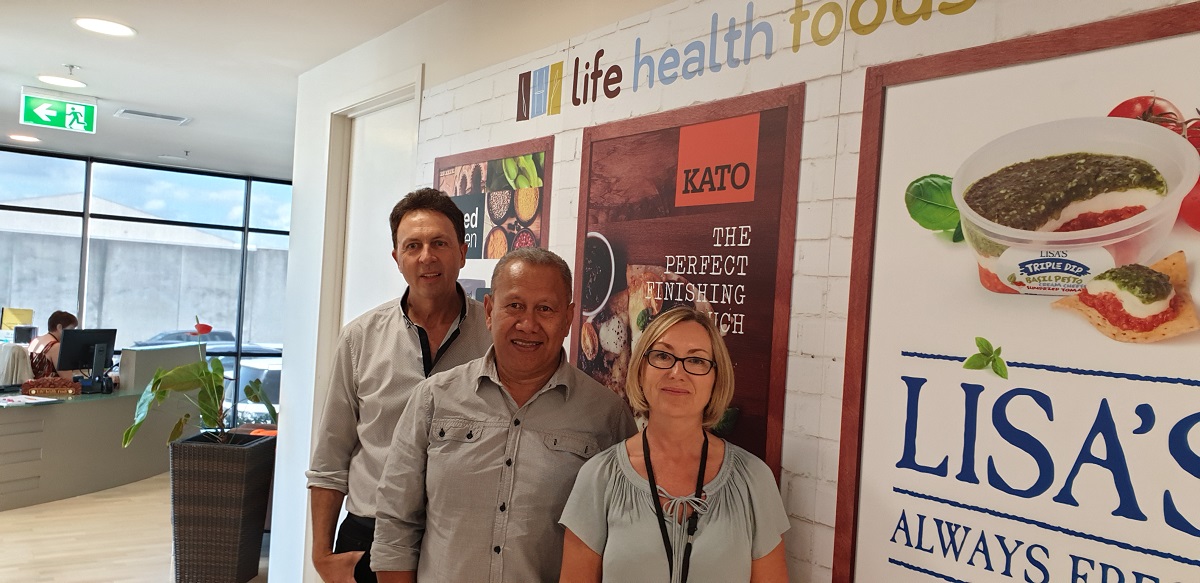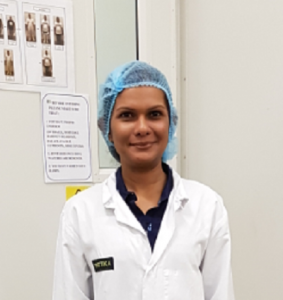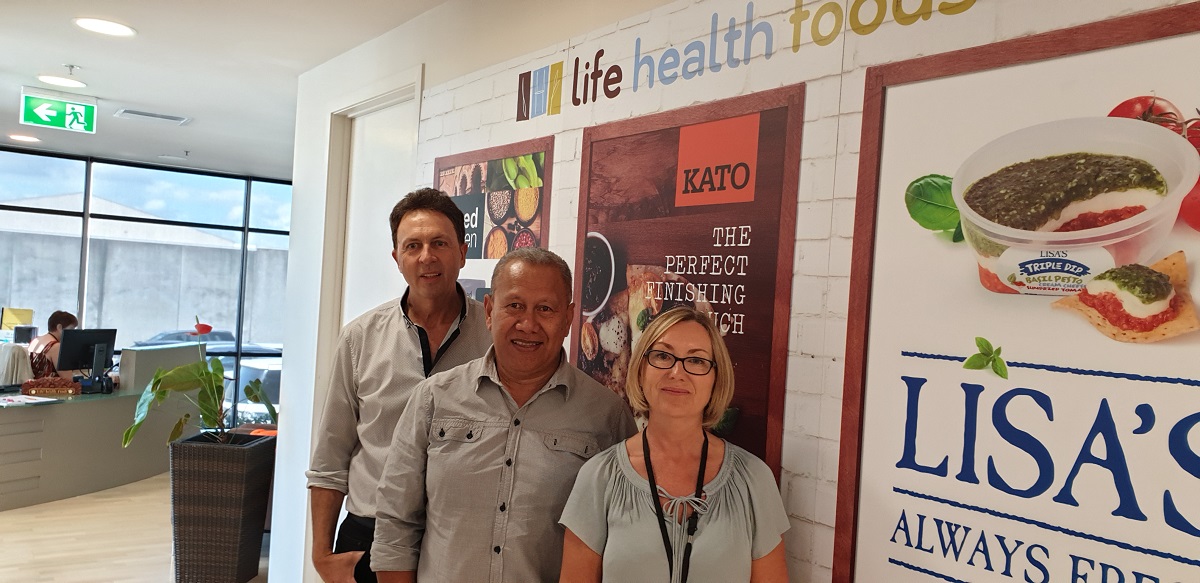We launched our first Train the Trainer course with Life Health Foods NZ Ltd (LHF).
We trained twelve staff over seven months. The course consisted of two full days of content delivery, three observed training sessions and three coaching sessions. Successful learners acquired NZQA unit standard 29692 – Deliver learning sessions to adults.
Background
LHF makes delicious plant-based food products. Its anchor brand, Lisa’s, was bought from entrepreneurial Auckland mum, Lisa Err, in 2002. Other brands include The Alternative Meat Co, Naked Cuisine, Bean Supreme, Prep Kitchen and Food by Chefs. The company is growing quickly to meet demand both in NZ and overseas. Consequently, training for their expanding workforce is a high priority.
LHF employs 150 people and there are 24 different cultures in the workplace. The manufacturing facility is in Auckland, Avondale, with 80% of the Production staff speaking English as a second language. They all share a common passion for healthy plant-based food. It is a fun, busy and fast-paced environment in which to successfully deliver training.

Left to right, Peter Suisted, Operations Manager; Eddie Mulinu’u, Production Manager and Bev Peacock, Senior Quality Assurance & Health and Safety Manager
Recognising the need
Documenting compliance with Standard Operating Procedures is key to the success of any food business. Compliance in NZ’s Food Industry is extremely strict to ensure food quality and safety.
Health and Safety training often extends beyond the internal workforce to include contractors as well. The management team at LHF need to have confidence their trainers are qualified to train and upskill and that training messages are understood and implemented. For their workforce, ‘training that sticks’ is all about successful delivery to a really diverse audience.
Peter Suisted, LHF’s Operations Manager, explains that with growth came the requirement for more robust processes and a more focused training programme. It was not a perceived deficiency in the standard of training that triggered the decision to develop trainers further. More the need for assistance with training methods and ability to assess the effectiveness of the training.
Several factors influenced his thinking:
- Safe Quality Food (SQF) audits to meet international standards, require evidence of competency and independent assurance that standards of training are being met.
- Accurate assessment of an individual’s skills is essential for a skills-based pay structure. It’s important to have a robust process. To link training plans to the skills-based matrix requires confidence in the successful delivery of that training.
- A trainer’s competence is measured both by their own qualifications and expertise as well as their skill level in communicating that knowledge. An NZQA assessment provides internationally recognized independent verification.
- A strategic focus on process improvement with less reliance on the QA team renewed the company’s commitment to growth through continuous improvement. Improvement is delivered in part through its training programmes.
Breaking new ground
Upskills had previously worked with LHF on other programmes but this was the first ‘Train the Trainer’ course. The observed sessions and coaching provided multiple feedback loops to reinforce the course content. This full-circle approach (as far as we know) is unique to Upskills.
We worked with Eddie Mulinu’u, the Production Manager. He was a helpful liaison between our team and the learners, ensuring follow-up work was completed. Eddie remarked that ‘I heard some positive comments about the Upskills tutors, they were engaging and our supervisors found it a friendly and positive environment in which to learn.’
Bev Peacock, Senior Quality Assurance & Health and Safety Manager was also a key stakeholder. Her focus was on verifying the team was qualified to train and that the training was successful.
Bev said that ‘Now that we have met SQF standards, we were asked:
- How do you do your training?
- Can you show us the training records?
- Who trained your staff?
- How do you know they are competent?
Now we know that our trainers are competent to train in their areas of expertise and can share their knowledge with the wider teams.’
Bev realized she could incorporate some of her goals for supervisor training with Upskills, into the Train the Trainer course Peter was commissioning. All three managers had slightly different but very specific requirements from the training. ‘By tailoring a course specifically to their needs, we were able to deliver something for everyone’, says Sarah Balfour, Upskills Director.
Why Upskills?
An off-the-shelf solution to this learning would not have worked for the LHF team. Building rapport in order to assess the learners’ understanding and capability was key to the success of the course. Peter Suisted was impressed with our team’s ability to relate to the LHF workforce and focus on each individual’s learning needs.
Our commitment and support for learners to complete the programme went beyond his expectations. High workload meant LHF staff were not always available for training as planned but we were able to rework the timeline to meet their needs.
A learner’s outcomes

Preetika Prasad, a Microbiologist at LHF, was one of our learners. She found strategies to overcome the challenges presented by different learning styles useful. Preetika found it beneficial to think through intuitive behaviour and have the logic behind it put into words so clearly. She found our tutors ‘encouraging and the training ‘applicable to our environment.’
One noticeable outcome from her training sessions has been the quality and volume of questions from her learners. ‘They are so much more engaged.’ Previously learners would nod in response to her questions. Now she notices that asking questions which check conceptual understanding, facilitate some probing and intelligent enquiries from her learners. This really shows her they have understood and taken the content on board.
Outcomes for our client
With the two-day content delivery sessions, there were different levels of capability, especially with regard to health and safety training. The LHF team felt the expectations of individuals learning at different speeds and with different competencies were managed well.
The three observed sessions integrated training theory with practice and guided learners to put all the new learning into practice. LHF now has a bank of 36 training plans that relate to their Standard Operating Procedures and Health and Safety guidelines. These can be used in a consistent way every time someone needs training on a particular machine, for instance.
Unexpectedly the course revealed hidden talents in some learners. A practical session highlighted good communication skills previously not seen in one individual. The management team now look forward to putting these skills to good use.
The course was designed and delivered to meet agreed goals. As a result, LHF managers now feel confident their trainers deliver effective training. What’s more, they can prove it.
Over to you
Does your organisation need to upskill on training competency? Upskills is an award-winning training consultancy, leading the way in training internal trainers.
We currently offer two Train The Trainer courses:
- Train the Trainer (tailored to your organisation for groups of up to 10 learners)
- Pop-up Train the Trainer (public format course, perfect if your organisation only needs to train 1 or 2 participants)
Contact us to find out more.






